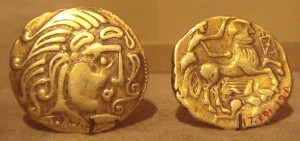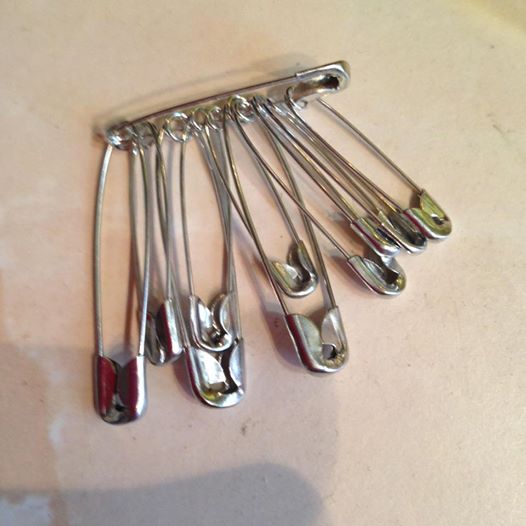Contemporary Paganism – like much of the rest of the world – has a deeply conflicted attitude to money. Money is probably even harder to talk about than sex and death. People tend to think it is a deeply unspiritual topic. It probably is – but we still need to talk about it.
Whenever the subject of Pagans and money comes up, there arises the vexed question of what spiritual services to charge for. The ethics of charging money for spirituality-related events is always tricky. On the one hand, there are those who argue that if they expend energy, they should be paid for it, and on the other hand, there are those who argue that money is the kiss of death to spirituality.

In order to think about this issue a little more clearly, let’s go back to a time before money, and look at how money was probably invented.
The tribe – a communal effort
Let’s imagine that I am the village spirit-worker. It’s my job to find herds for the tribe to hunt, and to talk with the ancestors and the spirits to find out useful knowledge, and to heal ailments suffered by the tribe. I contribute my knowledge and skills to the tribe in order that the people may survive and flourish. The hunters contribute their hunting skills, and bring back food. Various other members of the tribe cure leather, sew it together to make clothes, make tools and weapons and cooking pots, knap flint, and gather herbs. Everyone contributes, and everyone gets their share. And everyone knows that “what goes around comes around”. No-one keeps count of who owes what to whom, because everyone pulls together for the survival of the whole group.
The village – barter
In later centuries, a hierarchical view develops, and some people are considered more worthy of food and resources. Now, the tribe has settled in one place, and owns separate houses and separate cooking pots and separate hearths. A barter system develops, in which I exchange my work for food, clothes, and medicine.
The city – and money
After a while, people start to think that it is a bit inconvenient to exchange work for things. What if you need me to help out with your harvest, but you can only offer me a couple of chickens in exchange, but I don’t actually want any more chickens right now? Then it is easier to say, well I will give you this lump of gold, and you can exchange it for whatever you want later on. In addition, villages have got larger and become cities, in which the inhabitants don’t know everyone else in the town. Tribal links are weakened, perhaps dissolved. Family links and alliances become more important – and it is only in family settings that people don’t count the cost. Though perhaps guilds provide a kind of replacement for the tribe.
And that, I would suggest, is how money was invented.
The Celts started to use coins from the 5th to 1st centuries BCE, and minted coins based on Greek designs (they needed money for trade with the Greeks). The ancient Greeks began to use coins in about 700 BCE. The Romans began using coins in the third century BCE.
At various points in our lives, we return to one or other of these means of exchange. During a harvest, or when someone moves house, or at a Pagan camp, we return to communal effort mode. It feels idyllic, partly because we have lost our need to ‘count the cost’ in the knowledge that we are all mucking in together, and that the whole will be greater than the sum of the parts.
Sometimes, when money runs short, we return to barter mode. There are community credit schemes where you can exchange piano lessons for bread-making, or baby-sitting for bicycle repair.
A Pagan camp in communal effort mode
If you go to a Pagan event with a large number of people, and a significant number (say, more than half) of them are offering workshops, helping out with the fire-pit, organising the technical aspects, and generally contributing to the community, then you know that you won’t have to do more than your fair share, and you will get to benefit from other people’s workshops, and at this type of event, you probably don’t expect to get paid for your one- or two-hour long workshop, because you will attend at least ten other really good workshops given by other people, and you know that if you attend the same event in the future, you will benefit from the workshops there too. So this type of event becomes like a mutually supportive tribe – what goes around comes around – no need to pay speakers.
A Pagan camp in city mode
If, on the other hand, you go to a different type of Pagan event, where less than half of the participants are offering workshops, and the workshop leaders are contributing more than a couple of hours of their time each, and are not getting a comparable benefit from attending other people’s workshops (perhaps because the speakers have considerably more knowledge than most of the other attendees, or because it is a day or weekend event, and so there is no time for them to attend other people’s workshops) – then it’s a really good idea to factor in paying the speakers.
And it’s really important to note that in both these examples, the speakers get paid – it’s just that in the first example they are paid ‘in kind’ through receiving the benefit of workshops from other people; and in the second example, they get paid with money.
An exchange of energy
In an earlier post on the Pagan value of reciprocity, I wrote:
The giving of money in exchange for something does not create relationship, it ends it. If I pay in full for a service or a commodity, my obligation is discharged, and that ends the relationship. If I pay for a massage, a Tarot reading, or a workshop, that is because the masseur, Tarot reader, or workshop leader is not going to receive from me (at some unspecified future date) a massage, a Tarot reading, or a workshop. The relationship is ended by the payment. This is, I think, why Wiccans believe strongly that we should not charge trainees for training. Members of a coven are in a relationship, and payment for training would end that relationship. What you gain in return for teaching is an opportunity to formulate, clarify, and refine your own views in the process of transmitting them to others. You can also learn from your trainees. And in due course, you will have a coven to work with who can write rituals for you to take part in. All members of a coven are expected to contribute food for the feast and candles and incense for rituals, and help with the washing-up, however.
Note that I am not saying that charging money for services such as Tarot reading, or even rituals like a handfasting, is a bad thing. All services create some obligation. If I invite you to my ritual, you will probably feel obliged to invite me to yours. If someone gives you training in Wicca, you should feel obliged to turn up on time, make an effort to absorb what they try to teach you, and at some point in the future, to reciprocate by creating awesome rituals that they can enjoy, and to “pay it forward” by training others in Wicca.
Paying money for services rendered just ends the obligation. That can help to make things simpler; sometimes we do not want to enter into relationship with a person who has done something for us, because they are not part of our social group, or because – for one reason or another – we won’t see them again, so we discharge the obligation by paying them in full.
However, we do end up having a sort of relationship with people we pay money to – you go to a particular shop because the staff are friendly, or because the shopkeeper is nice; you go to the same hairdresser because you have become one of their clients.
The barter and exchange model, and the communal effort model, both create a web of obligation and relationship. That’s great – but there can be a shadow side to that, just as money has its shadow side. One can end up so obligated to others that they have power over you in some way, for example.
And then there’s capitalism
Of course, all of this gets much more complex and layered by the introduction of capitalism. Once capitalism rears its ugly head, you get third parties who want to make money by brokering the services offered by others, and as Rhyd Wildermuth recently pointed out, it has even infected hitherto communal exchanges like offering acquaintances a bed for the night.
The introduction of capitalism means that people can buy the services of one person, and sell them at an inflated price to someone else, and that a third party can invest in the whole enterprise, and expect to get a profit in return for their investment, despite not having done any actual work.
And then, even paying your workers comes to seem like a bad idea to some capitalists, so they go and kidnap a large population from somewhere else, treat them as property, and make them work for nothing. And that is how colonialism and slavery were invented.
Money is energy
So, whilst the abstract nature of money is partly what made capitalism possible, it is also a really useful marker for indicating that you are owed a certain amount of goods or services from the communal pool.
Of course, it might be wonderful to move towards a tribal model where everyone gets what they need, as Jonathan Woolley has suggested – but that would entail a considerable loss of individuality, and I am willing to bet that even the most ardent advocate of communal living is not quite ready to go there yet. And we do not have the kind of society that makes that kind of community possible for more than a short space of time, though we can pioneer it as a model.
I think it would be very difficult not to reinvent money, even if we succeeded in re-establishing a tribal / communal model, because there would still be a need for long-distance trade with strangers who would be outside the pool of communal effort, which means you need non-perishable tokens of exchange (otherwise known as money).
Nor do I think it is realistic to ask people to offer workshops entirely for nothing – you either get paid in kind, or with money, or you operate on a pay-it-forward model. Yes, I train people in Wicca for the good of the tribe, and I don’t expect money in return, but I do expect commitment and effort on the part of trainees, and one day, I can relax and let them run a ritual for me to participate in. What goes around comes around.
















